all of the selves we Have ever been
 For me, the COVID years were a fall from grace. There was the forced social isolation and the unplanned early retirement. Those seemed like momentous changes at the time, but I adjusted. Turns out, the long-term damage was to my wardrobe. While I never caught the virus or lost my sense of smell, I did suffer a complete loss of taste. Now, I am trying to come to my fashion senses. With minimal social contact during the pandemic, I cared little about my style or about the frequency with which I did the wash. Laundry happened whenever the fabric freshener ran out and my clothes marched themselves to the washing machine and pounded on the lid. My COVID wardrobe consisted of six pairs of sweat pants, an equal number of oversized t-shirts, and a pair of walking shoes. My back-up system for improvising consisted of an emergency body bag in basic black and a stash of single-ply toilet paper stockpiled when the good stuff disappeared from the shelves. Now, nearly four years out, the body bag and the single-ply toilet paper are in pristine condition, but I notice that some of my clothes are becoming see-through in should-not-be-seen places. “It’s time,” I tell myself, “time to put COVID behind me and get a real life and put on some real grown-up clothes. I officially declare the pandemic over and myself in recovery.” I dig deep into the closet in the spare bedroom to see what survived my bouts of clean-it-out-and-give-it-away during the heat of the pandemic. I try on some of my pre-COVID wardrobe, some of my old office styles. The look staring back at me in the mirror says “stuffed sausage.” Not a good look on a vegan. Because I haven’t shopped in more than four years, I have no idea what is in style. My COVID fashion statement read “survivor.” Now, in the fall of 2023, Vogue tells me that it’s all about “monochromatic tailoring,” and “the sultry return of lingerie-inspired looks.” What? Tailoring?! I haven’t worn a fitted waistband in 15 years, and I am guessing they haven’t seen my lingerie. It pre-dates COVID and is sturdier than a suit of armor. I am hoping that’s what the editors mean when they report that metallics are in style this season. Reading further down the list, somewhere between cinched blazers and kitten heels, I see that “90s nostalgia” is in as well, and I think, “Good Lord! I was pregnant for most of the 90s.” When I get to “denim-on-denim” I look over my shoulder and check my privacy settings. Appalled and thinking it’s not too late to become a cloistered nun, I see some terms I can reckon with: “oversized clothing” and “relaxed effortless style.” Well, well, well, it’s true: everything old is new again! I repeat the magic words: oversized, relaxed, effortless, and presto chango, I’m back in the game. It appears the key to fashion is patience. I am reinforcing my well-worn sweatpants with all that toilet paper, and just in case I am invited to a more elegant event requiring a runway look, I am holding onto the black body bag with the metallic zipper. I’ll dress it up by wearing a pineapple on my head. As they say at Vogue, “there are so many way to sprinkle a bit of magic into our seasonal wardrobes…and turn heads.” Oh, yes, there is…oh, yes, I will!
0 Comments
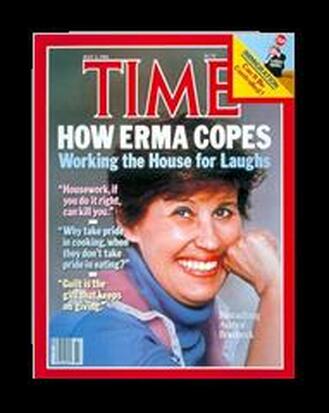 Except for a stint in the army, Uncle Lloyd spent his entire life on the family farm. He remained firmly attached to his caveman roots and his family ancestry working the land. This led to some peculiarities of manner and speech. For instance, when discussing if he might wish to donate some of the family heirlooms to the local Historical Society, Lloyd repeatedly referred to the organization as the Hysterical Society. That’s just the way the word came out when he spoke. No point in correcting him. He would not have heard the distinction. If Uncle Lloyd had lived to see the COVID pandemic, we might have given him some extra credit for his prescient prognostication. Panic-stricken, agitated, frantic, distraught, beside ourselves—all manner of hysteria applied. My one retreat during that time was the library. Even when the doors closed during the worst of the pandemic, the drive-through remained open. It was during that time that I reconnected with a long-gone but much loved member of that other Hysterical Society. I write today to honor her: Happy Birthday, Erma Bombeck! Even as a kid, I loved the newspaper. Not much for the comic section, I did try to peer into my future with regular readings of my daily horoscope. I practically earned an M.D. from the Ask the Doctor column, and I built a solid foundation for my future as a therapist by reading Dear Abby, but my favorite column was At Wit’s End by Erma Bombeck. While she was facing middle age, I was facing middle school. At a time when people did not “air their dirty laundry in public,” she made a living from it – a middle age, middle class porn star to the homemaking set. She talked about things we experienced but no one else talked about openly, especially not in front of children. It was a glimpse into the foibles of family life in the suburbs and a sneak peek into the private parts of a grown up life. During the COVID pandemic, as I was at my own wit’s end, I borrowed some of her old books from the library. The titles alone were hilarious: The Grass is Always Greener Over the Septic Tank, Motherhood: The Second Oldest Profession, The Ties that Bind and Gag, When you Look Like Your Passport Photo, It’s Time to go Home, and I Lost Everything in the Post-Natal Depression, among others. As I read and laughed out loud, I was reminded that so many “revolutions” have come and gone. Issues that once rocked the country came and went, and we remained standing. The women’s movement, including sexual freedom and birth control, and the mass migration of families to the fresh and growing suburbs were all new to Erma and her generation. While it was simply the state of things when I was born, I was reminded that it was all new and unnerving to the folks who came before me. They adapted. As businesses closed and workers fled to their home offices, and children went to school at their dining room tables dressed their pajamas, Erma gave me some perspective: we have been through revolutionary changes before; we will get through this one, too. What a gold mine Erma would have unearthed from our pandemic experience! She knew that humor mixed with love was the antidote to just about everything, and she instinctively knew just the right mix of each to keep us laughing and healing without hurting ourselves or others. Nietschze wrote that “in heaven all of the interesting people are missing.” I’m pretty sure he is wrong, at least since 1996. Maybe what makes heaven heaven is that it is full of all the people who died laughing. See you there, Erma. 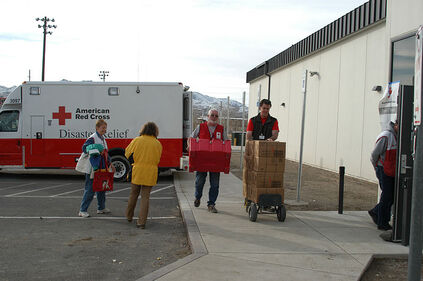 I’ve lost my edge. And my bounce. After a lifetime of rolling with the punches, my figure can only be described as “round,” and my squishy, inert orb rests on the playing field waiting to be kicked into play. I thought it was my age, but many people of different ages are complaining of a brand of inertia that has become the new long COVID even for those who never contracted the illness. The op-ed columns are screaming with commentary on “quiet quitting,” and yesterday, the mailman shared that he has been delivering mail for 30 years after a stint in the military. His days are getting longer because the post office is short on help. “There used to be a waiting list of people who wanted to work for the post office. It was considered a good job,” he tells me as he fills the mailboxes that line the lobby walls. “No one wants to work anymore. They don’t want to work weekends or long days. They don’t want to deal with the weather…” I feel for him as I rest on the steps watching him work and listening about folks who haven’t quit because they’ve never even taken the field. As if the news media were reading my mind, a headline pops up: Coronavirus Linked to Personality Changes in Young Adults. According to a Florida State University study, the pandemic “may have fundamentally changed the personalities of young people.” The long periods of social isolation seem to have made them moodier, more prone to stress, less cooperative and trusting, and less restrained and responsible. Researchers speculate that these changes may be due to a disruption in the completion of specific and normal developmental tasks and in the maturing process in general. My mind wanders to a Holocaust survivor I have known. He was herded off to a concentration camp when just an elementary school boy. He recalled standing in the morning line-up as wagons passed by the long rows of captives. The bodies of those who had died overnight or in the gas chambers filled the carts and hung from the sides. “These were our loved ones,” this survivor told me. “We were an emotional people, but we couldn’t even cry.” In his eighties, he now wept, grieving the loss of his loved ones along with the temporary loss of his own humanity at that terrifying and tragic time. While our lives in no way resemble the tragedy of the Holocaust, I can appreciate the point of view of the shell shocked, those individuals who have faced intense, life-threatening circumstances that produced feelings of helplessness, fear, inability to reason or to carry on with the normal tasks of daily living. How especially true this must be for children with wild imaginations and limited life experience, perspective, and power. In the last three years, we have been bombarded, not by bombs, but by disasters. First, COVID made its way into our awareness. There were the terrifying unknowns and dire predictions. The lockdowns. The disruptions to travel, daily life, work, school, and supply chains. There were loss and death, exhausted caregivers, and no end in sight. Anger and outrage were directed at the very people trying to assess the germ and protect us from its harm. And while we were trying to find a balance for living, we were inundated with news reports about climate change, wild fires, and shortages of every kind. Our government came under siege as our representatives attempted to complete the ceremonial task of certifying a presidential election. An unprovoked war broke out in the Ukraine, and new horrific war crimes were exposed each day on the news. That was soon followed by threats of a nuclear power plant disaster or the use of nuclear weapons. Fuel supplies were cut or sabotaged. We continue to struggle with skyrocketing inflation as the world teeters on the edge of financial collapse with the British and Chinese currencies in trouble. We have argued long about immigration, and now we are treated to political stunts on the evening news even as the entire world is struggling with mass displacement due to famine, disease, hunger, human rights disasters, war, violence, and climate change. New germs threaten to get us: monkey pox is on the rise everywhere; Ebola cases are increasing in Africa; and polio has been found in the wastewater in New York. Devastating mass shootings and frightening political upheaval are daily news fodder. We learn that we cannot trust people in leadership to reach solutions or protect us even as violent crime increases. And this week, we were served a new poison--a once-in-a-lifetime weather event that has devastated Florida, the Carolinas, Georgia, and parts of Virginia. And continuously humming in the background of all of this is the media shame machine. We have so many new labels to discredit people that we can no longer speak to one another in the civil manner needed to solve problems. No wonder young people are quietly quitting. We are all weary and frightened. Like overstimulated two-year-olds, we just want to take a nap and wake up when the world is all better. My mind wanders again, this time to the people aboard United Airlines Flight 93 on 9/11. When it became apparent that terrorists had hijacked their airplane and intended to do grave harm to the country, these passengers decided to take action knowing they would likely lose their lives in doing so. “Let’s roll,” Todd Beamer is credited with saying. The plane went down but spared the much larger disaster in the making. This morning electrical workers and Red Cross volunteers here in Columbus, Ohio and in many states both red and blue, started their engines. Their wheels began turning. Small armies of the tired but determined left home for disaster zones in Florida, the Carolinas, Georgia, and Virginia. Hang in there, kids. We may be weary, but when it matters, this is how we roll. The restaurant filled up and bubbled with life much like the champagne glasses on the next table. It was the first week in which the world began waking from the long COVID winter. My friend arrived, and we greeted for the first time since it all began. We were each in a contemplative mood, a condition of both our ages and the universal outcome of a pandemic in which there was little else to do but think and worry. Near the end of the evening, as we pondered our futures in retirement and our need for a new sense of purpose, I shared my mounting regret that I had not had the wisdom to ask my aging relatives what it was like to grow older, to ask what their own lives had been like when they were young, to study the path between youth and older age. They had always seemed old to me. Youth was never a condition I imagined in them. Now it was too late. My friend nodded in agreement and shared her own sorrow about the time she spent caring for her beloved and now deceased mother: “I wish I had spent less time managing her, and more time just being with her.” That arrow plucked from her heart pierced mine too. We sat quietly, each bleeding a little on the inside. Both of us baby-boomers, we grew up in a mechanical age of industry and assembly lines. Efficiency experts had been elevated to the stature of gods. We reached young adulthood with business management principles overflowing the factory floor onto our personal lives. Sewn into us was a long, sturdy thread of advice on how to efficiently manage our time, money, children, aging parents, health, weight, and all of our affairs. Self-help gurus were everywhere to remind us that it was up to us; we were on our own. The message came through loud and clear: successful people are competent; competent people are good managers. Both bright gals, we studied the literature. This societal message became the inheritance of our children, too. From the time they entered pre-school, our kids were walloped with advice about how to “build a resume for college”--that ferocious mix of the right schools, academic rigor, homework, arts, sport, and community service. Aspiring to become competent parents, we tried to keep up. Not to keep up was to become a failure and the subject of gossip and criticism. Any life troubles were assumed to reflect our botched management: a failure to manage the retirement portfolio, a failure to manage the child’s education, a failure to manage the care of aging parents, a failure to manage health care screenings, a failure to manage the social media presence, the in-boxes, the on-line images, the professional brand… We knew what the neighbors were saying: “if only they had been better managers.” In mid-life, we entered the digital age. A host of new tools fooled us about time savings and the actual distance between people. Our tools became another distraction in the service of helping us to manage. But much got lost while we were busy managing no matter how fancy the tools or how many bytes in the memory. Time ran out. Parents died. The children grew up. Friends moved away. While the forms were getting signed, the tuition paid, the countless appointments kept, we forgot to drink up the moments and the company. Blinded by the demands of life and the counsel of experts, we believed the successful completion of tasks was the relationship. We forgot to be present. Oh, what I would give to go back in time for one more day, to snuggle up with my children in our big comfy chair with nothing else on my mind save for their sweetness and warmth! Or a quiet Sunday gathered around my grandparents’ kitchen table to talk about their youth and their dreams. Were their dreams realized? Did it matter? The grandparents are gone now, the parents, aunts, and uncles, too. The children are grown and busy. They are managing their own lives. And this generation that grew up building their resumes for college is not giving us grandchildren. There is already too much for our kids to manage. As I move toward the age when I will become the managed and not the manager, I am aware that the issue is not unique to my friend and me, a couple of women with a few regrets. The pandemic awakened a realization in all of us that managing our lives is not enough. We isolated, masked, sanitized, and sacrificed and still could not hold a tiny germ at bay. We learned that life can be fleeting, surprising, and sometimes tragic no matter hard we work to manage it. Perhaps the post-COVID labor contractions reflect the birthing of a new way of living in which we will care for ourselves and each other at all stages of the life cycle, not with our clocks and our calendars, but with our time and our presence. When my own life ends and the children come to clean out the closets, I hope they will find important dates still circled on my calendar, a reminder of happiness to come, a few cherished mementoes stashed in the attic that link them to their past and to me, some presents tucked away for their future holidays, and a cup of joy upon the stove to sip and to share as they sort through all of the pieces of a long life. When the cupboards are empty and their trunks are full, I hope they find that they had plenty of love and no regrets. 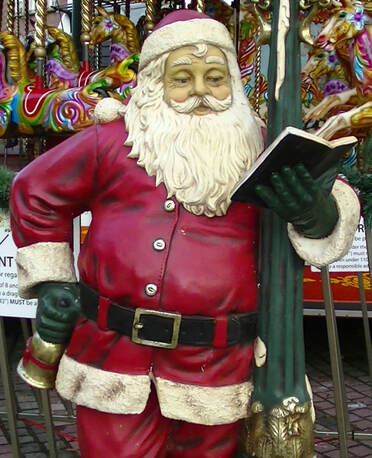 As we have opportunity, let us do good to all. - Galatians 6:10 I am a woman on a mission. I am looking for a few good men. Well, not just men. I am looking for good people of any sort. Two stories have taken up residence in my head launching me on this mission. The first story is about Edmund Burke, a respected member of the British Parliament in the 18th century. The words, all that is required for evil to triumph is for good men to do nothing, have frequently been attributed to Burke. While those exact words have not survived fact checking, in Thoughts on the Cause of the Present Discontents (1770), Burke is recorded as saying: When bad men combine, the good must associate; else they will fall, one by one, an unpitied sacrifice in a contemptible struggle. The second story on my mind is the Bible’s tale of the destruction of Sodom. The Lord tells Abraham that the city will be destroyed due to wickedness. Abraham’s nephew, Lot, lives there with his family. Abraham beseeches the Lord to consider saving the city if fifty righteous men can be found. The Lord agrees, but Abraham continues to negotiate. They settle on a final number, and the Lord says, “For the sake of ten, I will not destroy it.” We all know how the story ends: the city burns, everything is destroyed. Lot escapes, but his wife disobeys God’s instructions. She looks back as she flees and turns into a pillar of salt. It has been impossible to escape the daily news in 2021. Dare I look back? The year began with a pandemic threatening our health, weather events threatening our planet, and angry politicians threatening our democracy. People have remained uneasy and some have given voice to a fear that we are approaching the end of times. I am not a prepper. I have no fortified bunker. I do not stockpile nonperishable foods or practice survival skills, but I do want to be ready. If the Lord offers me a deal, I want to have list so that I can name names. In a country of 334 million people, I pray I can find fifty good ones. So far, I’ve got Ed, the homeless gentleman I wrote about on November 16th. A week later, I encountered a nameless and faceless truck driver, but I jotted down his license plate number. God will know the driver by his deeds. I encountered the truck driver as I headed out of Columbus via Interstate 71 North. The urban traffic was heavy and aggressive, moving much faster than the legal limit. My entire body was brittle with tension as I held my breath and I merged from the city ramp onto the highway. Traffic continued to whiz past me even though I was going the maximum posted speed. Feeling anxious and looking forward to getting beyond the city limits, I tucked myself in behind a Wooster Motor Ways truck. Remarkably, the driver maintained the speed limit and slowed for vehicles merging into the heavy traffic. I felt a rush of relief in finding this personal escort, a guardian angel. I followed the semi out of town and through the countryside. We traveled a good sixty miles together before parting ways at the Route 30 exit. While it is a small thing to obey the traffic laws and show consideration to other drivers, it is not without significance. Maybe God will see it as a test of character, a measure of goodness. Then on November 29th, I met Ahmal. After several days of cold, rain, sleet, and snow flurries, the sun came up. By mid-afternoon the thermostat registered a sunny 42 degrees, and I headed outside for a walk. A half a block from home, I saw two obstacles blocking the narrow path ahead. One item appeared to be a bulging gym bag about three feet wide. Bright orange extension cords poked out from the top. Next to the bag was a Shop-Vac. As I came closer, I saw a man standing on the curb studying his smartphone. “Do you know where West Fifth Avenue is,” he asked. “It’s about a half a block straight ahead.” The man looked so relieved, I thought he might cry. “That’s good. That’s good,” he said as he picked up his things. “I’m headed that way. I’ll walk with you.” The man refused to let me carry a thing even as sweat poured from his scalp and dripped onto his shoulders. A few steps in, the man sat the items down in an attempt to re-adjust his load. At that point, I insisted, “hand me the Shop-Vac.” As we made our way to the bus stop, the man told me his story. He had gotten a ride to a local business to detail a food truck. The splattered grease stain that covered his white tea shirt corroborated the story. He told me that he had loaned his rent money to a family member with the promise that the money would be repaid by the time the rent came due. The borrower had not repaid the loan. With just two days remaining, this desperate but determined man was taking every odd job he could find to meet the first-of-the-month deadline. He told me how he had lost his regular job doing yardwork and landscaping when the weather turned cold. Perhaps there was more to the story, but I would not look for fault in a man willing to work this hard to pay his rent on time after sacrificing for a loved one. Slowing down, the man squinted and looked ahead, “I don’t see it. I don’t see no bus stop!” Feeling his exhaustion, I encouraged him to keep going. “The sign is hidden by the trees. We’re almost there.” We took a few more steps. “I see it! I see it now! I got about a two hours bus ride to get home and change so I can get to my next job.” As I set the Shop-Vac down on the sidewalk next to the bus stop sign, the man asked me my name. “Lilli,” I said.” “I’m Ahmal,” and he threw his arms open wide, embracing me with the gratitude of a man whose life had been saved. I felt entirely unworthy and said a prayer of thanksgiving for the sun and the mild temperature that propelled me onto the bike path and into his arms, for the strength to share the mental load and to carry his Shop-Vac to the bus stop. And because I was fortunate, my rent was paid. In this time when everything is askew and the headlines warn of more doom and gloom to come--the end of democracy, the end of decency, the end of the earth, I am buckling down on my mission to find fifty good people. I add Ahmal to the list. The holiday season is a good time to embark on this exercise. In the Christian tradition, Christmas marks the birth of a savior. It is a story of hope, a season of second chances. For Christians, that is not fake news, it is the Good News. But good does not triumph easily. Because it comes into the world quietly and with humility, it risks being overlooked and demeaned. Sometimes there is no room for it at the inn. But a light shines upon goodness for those who seek it. Wise men travel far to find it. In the secular tradition, Christmas is about a jolly old man who sees us when we’re sleeping. He knows when we’re awake. He keeps track of our deeds with his own list of who is naughty and who is nice. He checks his list not once but twice. The nice are rewarded on Christmas morning. I had the good fortune of being born in the post-war era, a time of growth, abundance, and opportunity. I never questioned that I lived anywhere but in the greatest country on earth. Despite our history and our difficulties, I always believed that we would keep growing, and that, in the end, good would triumph in this homeland. The past few years have challenged my beliefs and sense of national identity. COVID has rattled the nerves of everyone on the planet and arrived at a time when democracy was already under grave threat all around the world. News of the day can make it hard to keep believing. But it is Christmas. Whether you celebrate in the Christian tradition or the secular, Christmas is an important reminder of hope, a message that God, or the Something Greater, does not give up on us. Goodness matters and good can be found in surprising places. Mankind is an imperfect lot, but also an unfinished one. There is still time. May goodness find you this Christmas. Prepare to name names.  With democracy crumbling all around the world, I went looking for some happier news that I could sink my teeth into. I landed on something big! Today, December 8, 2021, is National Brownie Day. I am not talking here about apprentice Girl Scouts; I am talking about the chewy delicious food that made it hip to be square. Of course, controversy swirls even in a world of just desserts. Who is the actual inventor of the brownie? Is it the socialite Bertha Palmer, wife of the Palmer House Hotel owner? Some say that in 1893 she instructed her hotel chef to come up with a small cake that would fit in a boxed lunch. The Palmer House brownie contained walnuts and apricot glaze. The invention stuck to Bertha’s hips and to the Palmer House Hotel menu. A few years later, in 1904, some real housewives in Maine claimed the title of inventor with their recipe for the Bangor Brownie. Who knows? But by 1907 the brownie appeared for the first time in a cookbook, and the recipe gained wider circulation. Since then, Americans have consumed brownies in numbers that make the Build Back Better budget look measly. During the pandemic, I came across a simple brownie recipe that is my family’s new favorite comfort food. Given the length of the pandemic, I have made it many times. These brownies are delicious warm and even better a few minutes out of the freezer. The recipe calls for chocolate chips, and we have tried them all: mint, peanut butter, and various types of chocolate. Our favorite is the Ghirardelli Premium Baking 60% Cacao Bittersweet Chocolate Chips. (Sorry, Hershey’s!) Feel free to experiment. Remember that you're not alone if you prefer nutless--60% of people do. One Bowl Brownies (courtesy of Hershey’s) Makes 16 brownies. Ingredients: 1 ¼ cups sugar 2 eggs ½ cup melted butter 2 teaspoons vanilla extract 2/3 cup all-purpose flour ½ cup Hershey’s Cocoa ½ teaspoon salt ¼ teaspoon baking powder 1 cup chocolate chips Directions:
Should the news leave you in a mood to stir things up, grab a bowl and a hand mixer. Take to the streets with an armful of brownies. Savor the wonders of this American invention and the reminder that we are still capable of creating good things that last. (With or without the nuts.) 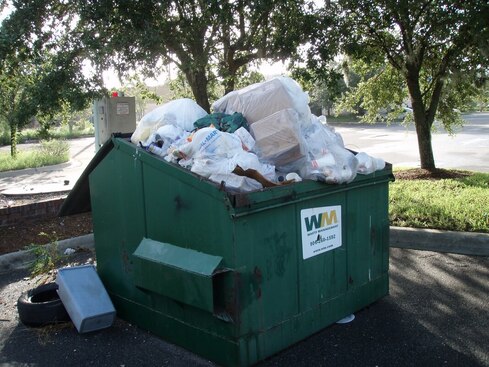 Back on July 26th I wrote about satisfaction, a lesson divined at the dumpster. Last week, I returned to the dumpster for more enlightenment. I wasn’t actively seeking enlightenment, I was just taking out the trash, but enlightenment comes when it will. The spirit knows what we need, and it finds us. As I approached the metal bins on Tuesday morning, I noticed a man already there. His back was to me, and he was pulling items from the smaller of the two dumpsters. A long, brightly colored fleece scarf and a black wool jacket were draped over the side of the bin. The man’s head popped up, and in his hand was a backpack, black canvas with brown leather trim. The man studied the backpack carefully. I said hello as I approached. The man held out the backpack, “Look how nice this is. Why would anyone throw this away?” I agreed the backpack was very nice as he continued to study it. “Oh! It’s missing a snap. I can fix that!” “Are you the man who lives behind the storage facility next door,” I asked. “No, that’s Dave, but I watch out for him. I just found him a coat,” and he pulled the black wool jacket from the side of the dumpster. As if on cue, Dave and a woman walked up behind me. “Hey, take this,” and he tossed the jacket to Dave. “Winter is coming. You’re gonna need it.” Dave thanked him and walked on. Ed introduced himself and explained how he became homeless. “I didn’t always live like this,” he said. “I’ve come and gone from this life mostly due to drugs.” Ed explained that he was a skilled tradesman and once lived a good middle class life, owning a boat and sailing for a hobby. Ed struggles with bi-polar disorder, and the prescription medication makes him feel lifeless and numb. For years, he has been waging his own war on drugs. Sometimes he thinks he is winning. Other times, he becomes a traitor, doing business for the other side. Most recently, he has been going to the local methadone clinic every day and trying to stay clean except for the occasional use of reefer. I couldn’t help but notice that Ed is a handsome man. His face is tan and glowing on a chilly morning. He has a broad and easy smile that reveals straight white teeth. He is clean shaven and fit. Ed explains that he gets around on a bicycle and logs hundreds of miles a week. He uses his bicycle basket and a grocery cart to gather and deliver goods to other homeless people in the area. He is their Robinhood. Ed is using his talent as a skilled tradesman to craft a shelter from the loose pieces and parts that he finds. I see him eyeing an old gas range. “That’s a nice stove,” he says. I wonder how he will get it to his makeshift home. I have no doubt that he can get it working. As we chatted, Ed continued to poke around inside the dumpster. He pulled out a soft drink can that was unopened. That find is followed by a sealed bag of ground coffee. “Look,” he said as he held the grocery items out toward me. “Someone kind must have left these for me.” Later that day as I grudgingly “made time for exercise” and pushed myself outdoors onto the shared bike/walking path, Ed zipped by me on his bicycle. He was pedaling hard. The wind was in his face, a wool cap covered his head. Ed looked happy. And free. And a spirit rose from the dumpster and whispered to me: Free is a lifestyle. A frame of mind. A choice. Admonished, I walked on pondering my own recent restlessness and moments of dissatisfaction. A combination of pandemic boredom and isolation leave me feeling like a prisoner some days. Despite my best efforts to stay engaged and in touch, there are times when I feel as though I am living someone else’s life, I entered the wrong movie set. I wonder where my life went. I hear my friends and neighbors speaking of these same experiences. They tell me that despite their boredom and loneliness, they are finding it hard to rally the motivation to move beyond it. They feel stuck. There seems to be a new type of long-COVID affecting even those who never suffered the disease. Meaning dripped from our lives during the long months as COVID stretched out like a pipe full of pin holes. The initial emotional response to fight and survive has diminished. People are weary and searching for where the meaning might be. There is an awareness that things have changed. We have changed. Our pre-COVID lives are not coming back. What will our new lives look like? How will we get there? And then there is Ed. He is the star of a survivor show, a winner at an extreme sport, a master of an obstacle course. Like others who take on hard for fun, Ed finds a sense of belonging, mastery, independence, and generosity in his homeless lifestyle--all of the ingredients of resilience and a good life. He does not struggle to explain himself or to fit in. He is an expert and an adventurer without the limitations of expectations and the pain of failures. Ed speaks with energy and with joy – his day is filled with exercise and doing, moving mountains even if made of trash. I am envious. He has no shame. He accepts himself and his lifestyle. He is busy doing good for others. He still believes people are kind. He doesn’t examine the discarded groceries for expiration dates or wonder why someone might be lazy or careless in throwing them into the dumpster. Ed lives on a rugged urban frontier, a grocery cart his covered wagon. He is focused on survival, but he is not self-centered. His survival is possible because he is protecting the survival of others. He lives without technology but is well equipped to live in the world and to master it. He is not a social problem, he is a problem solver. Discarded himself, he sees potential in everything. When we have all the time in the world, it is hard to fill that time with meaning. I can see in Ed that effort gives meaning to action, to life. Life is better when you keep moving and keep believing that people are kind and looking out for you, when you take pride in looking out for them. Mick Jagger never did come to meet me at the dumpster, but on Tuesday, Ed was there to greet me. Ed is a rock star, too. |
AuthorLilli-ann Buffin Archives
July 2024
Categories
All
|
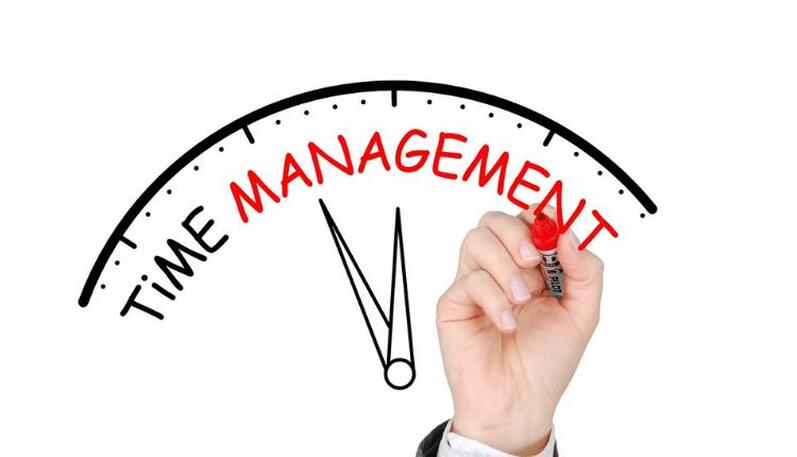
 RSS Feed
RSS Feed